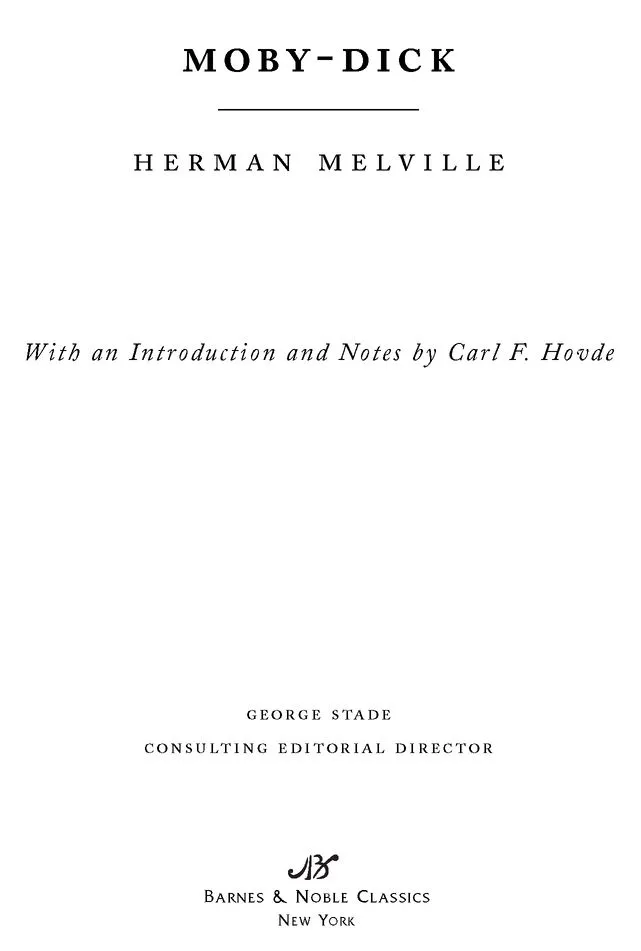- The Blacksmith.
CHAPTER CXIII. - The Forge.
CHAPTER CXIV. - The Gilder.
CHAPTER CXV. - The Pequod Meets the Bachelor.
CHAPTER CXVI. - The Dying Whale.
CHAPTER CXVII. - The Whale Watch.
CHAPTER CXVIII. - The Quadrant.
CHAPTER CXIX. - The Candles.
CHAPTER CXX. - The Deck Towards the End of the First Night Watch.
CHAPTER CXXI. - Midnight.—The Forecastle Bulwarks.
CHAPTER CXXII. - Midnight Aloft.—Thunder and Lightning.
CHAPTER CXXIII. - The Musket.
CHAPTER CXXIV. - The Needle.
CHAPTER CXXV. - The Log and Line.
CHAPTER CXXVI. - The Life-Buoy.
CHAPTER CXXVII. - The Deck.
CHAPTER CXXVIII. - The Pequod Meets the Rachel.
CHAPTER CXXIX. - The Cabin.
CHAPTER CXXX. - The Hat.
CHAPTER CXXXI. - The Pequod Meets the Delight.
CHAPTER CXXXII. - The Symphony.
CHAPTER CXXXIII. - The Chase—First Day.
CHAPTER CXXXIV. - The Chase—Second Day.
CHAPTER CXXXV. - The Chase—Third Day.
Epilogue.
ENDNOTES
DICTIONARY OF SEA TERMS
INSPIRED BY MOBY-DICK
COMMENTS & QUESTIONS
FOR FURTHER READING
FROM THE PAGES OF MOBY-DICK
Call me Ishmael.
A man like Queequeg you don’t see every day, he and his ways were well worth unusual regarding.
Ship and boat diverged; the cold, damp night-breeze blew between; a screaming gull flew overhead; the two hulls wildly rolled; we gave three heavy-hearted cheers, and blindly plunged like fate into the lone Atlantic.
Starbuck was no crusader after perils; in him courage was not a sentiment; but a thing simply useful to him, and always at hand upon all mortally practical occasions.
His bone leg steadied in that hole; one arm elevated, and holding by a shroud; Captain Ahab stood erect, looking straight out beyond the ship’s ever-pitching prow.
“Aye, Starbuck; aye, my hearties all round; it was Moby Dick that dismasted me; Moby Dick that brought me to this dead stump I stand on now.”
“He tasks me; he heaps me; I see in him outrageous strength, with an inscrutable malice sinewing it. That inscrutable thing is chiefly what I hate; and be the white whale agent, or be the white whale principal, I will wreak that hate upon him. Talk not to me of blasphemy, man; I’d strike the sun if it insulted me.”
Ahab’s quenchless feud seemed mine. With greedy ear I learned the history of that murderous monster against whom I and all the others had taken our oaths of violence and revenge.
All that most maddens and torments; all that stirs up the lees of things; all truth with malice in it; all that cracks the sinews and cakes the brain; all the subtle demonisms of life and thought; all evil, to crazy Ahab, were visibly personified, and made practically assailable in Moby Dick. He piled upon the whale’s white hump the sum of all the general rage and hate felt by his whole race from Adam down; and then, as if his chest had been a mortar, he burst his hot heart’s shell upon it.
There are certain queer times and occasions in this strange mixed affair we call life when a man takes this whole universe for a vast practical joke, though the wit thereof he but dimly discerns, and more than suspects that the joke is at nobody’s expense but his own.
At such times, under an abated sun; afloat all day upon smooth, slow heaving swells; seated in his boat, light as a birch canoe; and so sociably mixing with the soft waves themselves, that like hearthstone cats they purr against the gunwale; these are the times of dreamy quietude, when beholding the tranquil beauty and brilliancy of the ocean’s skin, one forgets the tiger heart that pants beneath it; and would not willingly remember, that this velvet paw but conceals a remorseless fang.
They were one man, not thirty. For as the one ship that held them all; though it was put together of all contrasting things—oak, and maple, and pine wood; iron, and pitch, and hemp—yet all these ran into each other in the one concrete hull, which shot on its way, both balanced and directed by the long central keel; even so, all the individualities of the crew, this man’s valor, that man’s fear; guilt and guiltiness, all varieties were wedded into oneness, and were all directed to that fatal goal which Ahab their one lord and keel did point to.


BARNES & NOBLE CLASSICS NEW YORK
Published by Barnes & Noble Books 122 Fifth Avenue New York, NY 10011
www.BookishMall.com.com/classics
Moby-Dick was first published in 1851.
Published in 2003 by Barnes & Noble Classics with new Introduction, Notes, Biography, Chronology, Inspired By, Comments & Questions, and For Further Reading.
“Dictionary of Sea Terms” is adapted from Richard Henry Dana’s The Seaman’s Friend, originally published in 1845.
“At Melville’s Tomb,” from Complete Poems of Hart Crane by Hart Crane, edited by Marc Simon. Copyright 1933, 1958, 1966 by Liveright Corporation.
1 comment